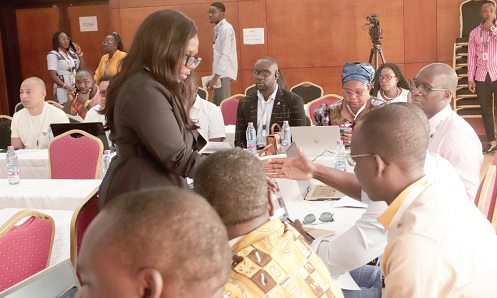
Capacity-building on disease surveillance underway in Accra
Scientists have gathered at the Noguchi Memorial Institute for Medical Research (NMIMR) in Accra to develop tools and build capacity on the African continent for effective surveillance of endemic poverty-related diseases and emerging pathogens.
The four-day programme, which started on Tuesday, has scientists from 12 African countries and three European nations as participants.
The first in-person meeting of the Pan-African Network for Genomic Surveillance of Poverty Related Diseases and Emerging Pathogens (PANGenS) Consortium is also intended to lead to improvement in disease control programmes on the continent, including the detection of potential epidemic threats early for appropriate intervention measures.
It is being spearheaded by the NMIMR, in collaboration with the participating countries.
Tuberculosis and malaria, two main infectious diseases Africa is battling, are the immediate priority goals of the consortium, which has genomic surveillance as its focus.
Tuberculosis, Malaria
A bioinformatics implementation expert from the Africa Centre for Disease Control and Prevention, Dr Gerald Mboowa, said the burden of infectious diseases in Africa revealed that tuberculosis and malaria were top on the list, and that eliminating them required surveillance.
He said genomic surveillance would be able to pick the tiniest organisms and also detect changes in the organisms that were being tested.
Giving an overview of the project, a visiting professor of the University of Namibia, Prof. Stefan Niemann, said on the global level, especially in Africa, tuberculosis was a potent contributor to overall mortality, making it a major global health problem with approximately 10 million new cases and 1.5 million deaths annually.
He said drug resistant, multidrug resistant and extensively drug resistant tuberculosis strains challenged global tuberculosis control, adding that malaria, which was also emerging as drug resistant, causes more than 250 million cases and 627,000 deaths globally, with over 95 per cent of such cases and facilities occurring in children under five years.
The Director of NMIMR, Prof. Dorothy Yeboah-Manu, said the PANGenS project fitted very much into what NMIMR did, adding that all drug efficacy studies, etymology and drug resistance surveillance in the country were done at the NMIMR.
Genomic research
The Pro-Vice-Chancellor, Office of Research, Innovation and Development, of the University of Ghana, Prof. Felix Ankomah Asante, said although tuberculosis and malaria continue to plague the African continent, killing millions annually, its capacity in genomics research had huge lapses and had over the years posed significant challenges to the continent’s ability to combat the disease and contribute to the global health system.
He said unravelling the intricacies of tuberculosis granted the continent insights into its virulence, drug resistance, transmission patterns, evolution and possible emerging threats.
“This knowledge is invaluable as we are in the age of targeted interventions, personalised medicine, efficient and innovative diagnostic and artificial intelligence tools to combat tuberculosis on a global scale.
Genomics has also been a beacon of hope in combating malaria,” Prof. Asante added.
